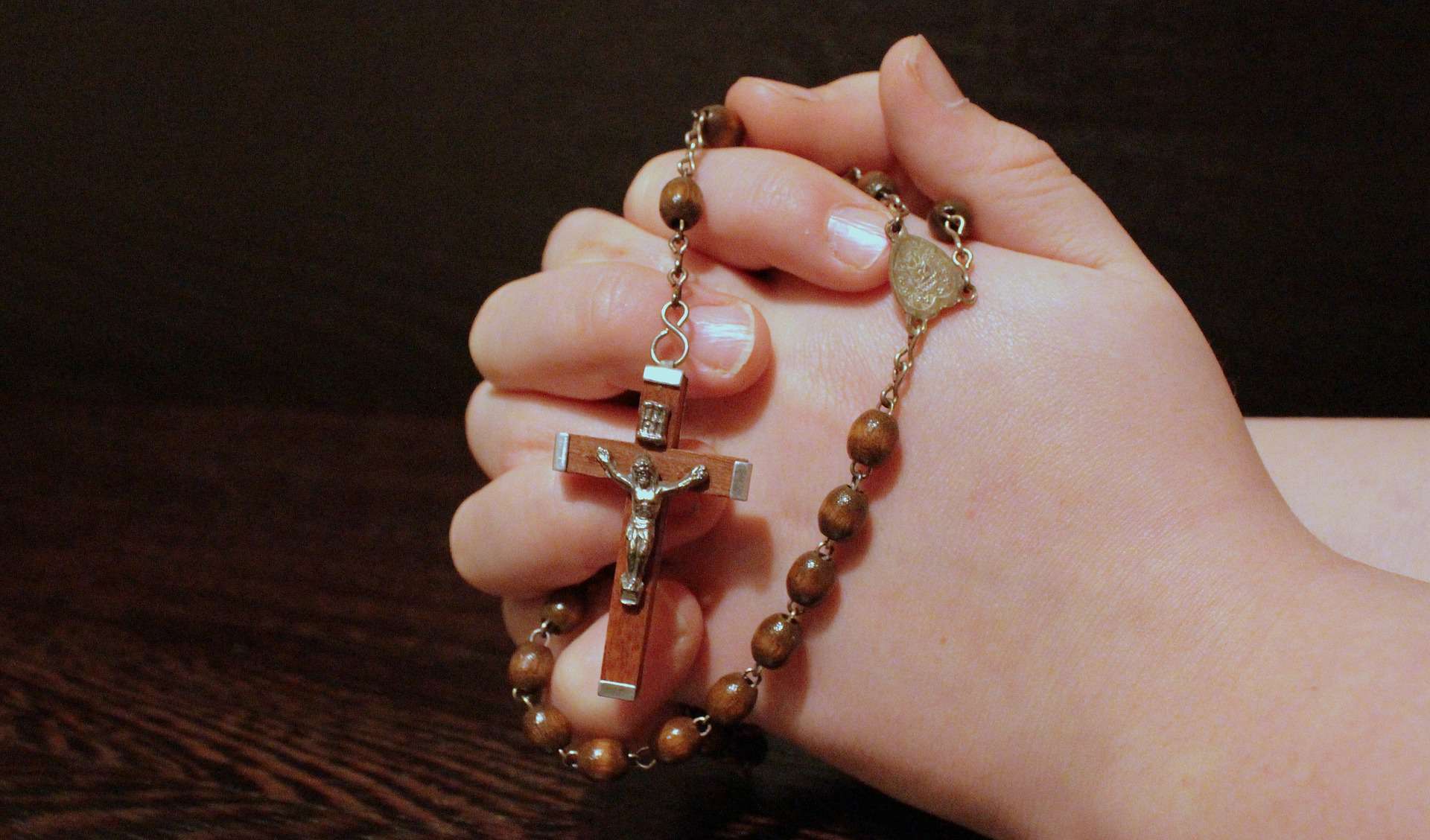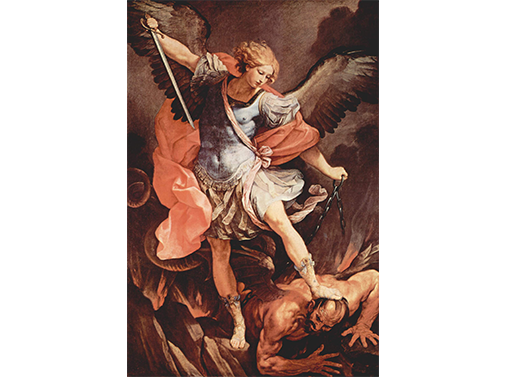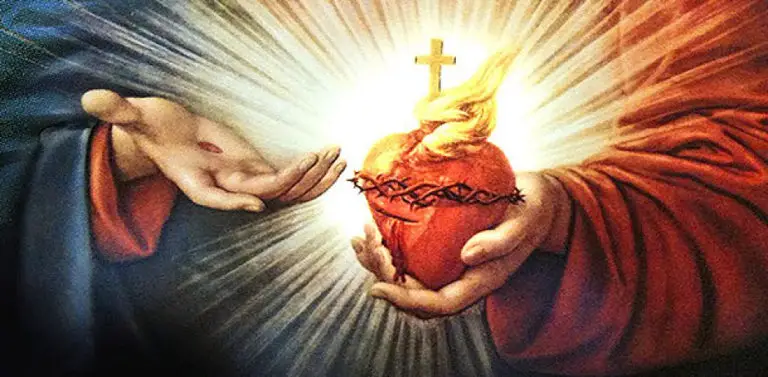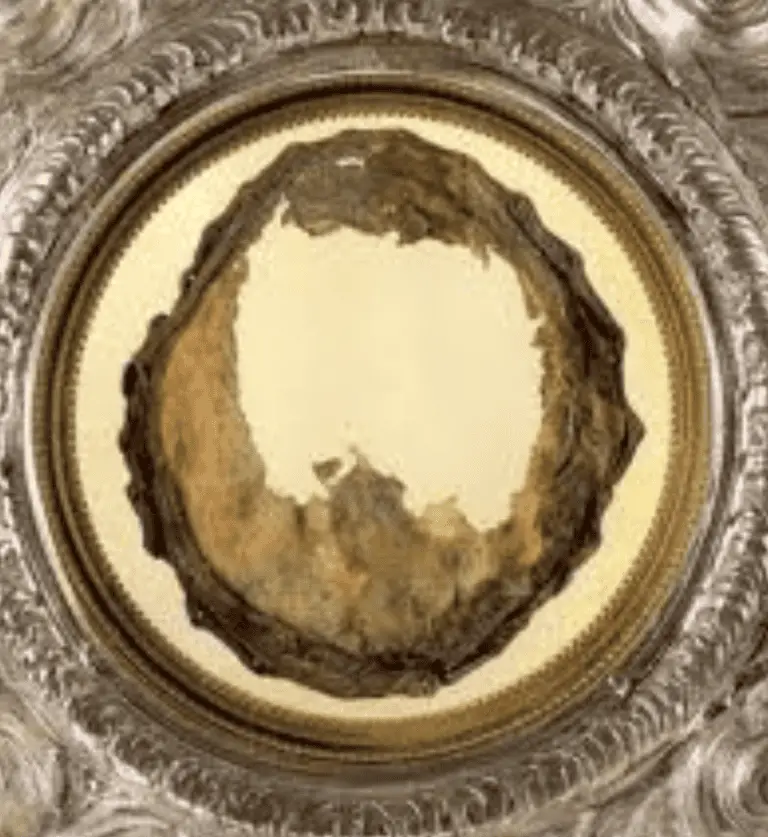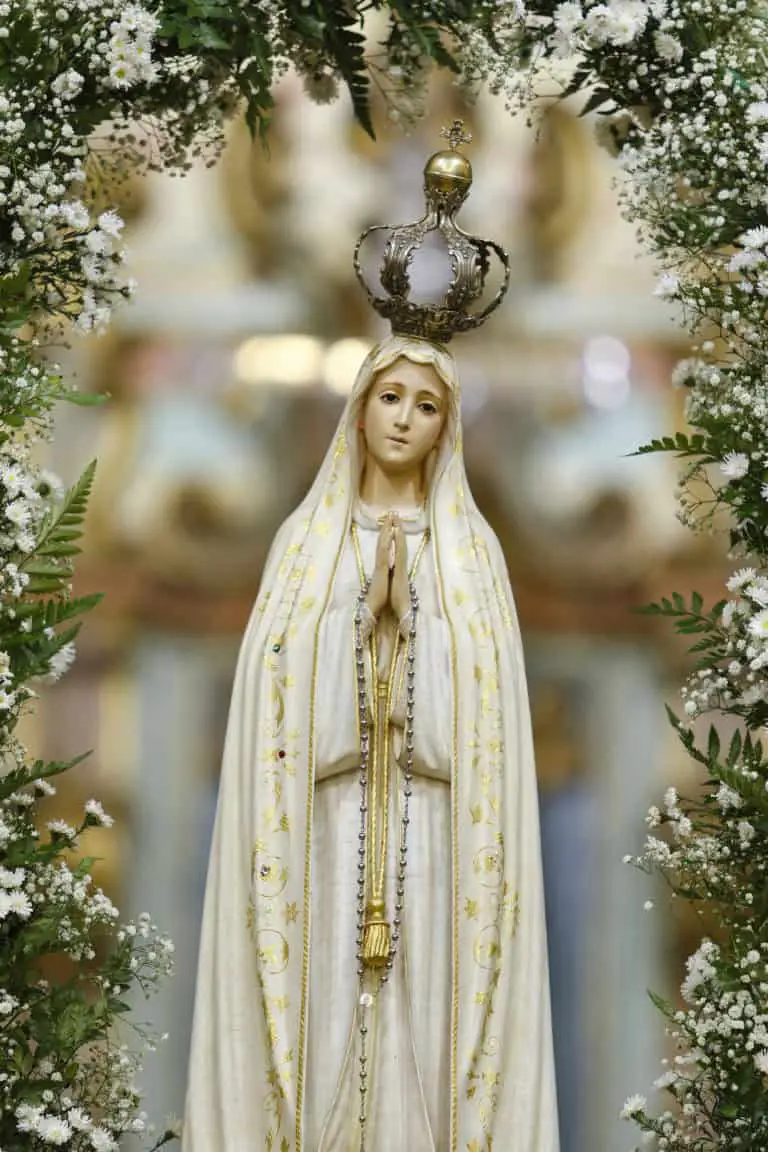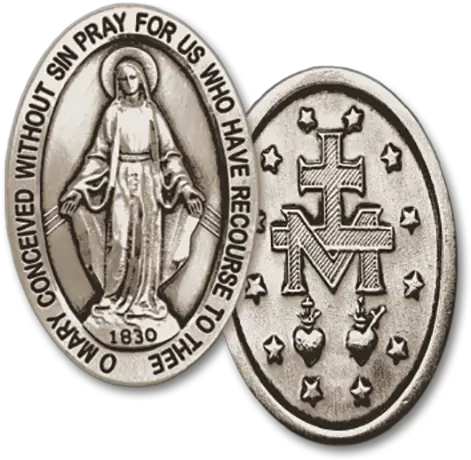What is the Rosary, its’ history and promises?
The Rosary, prayed by Catholics, is a form of vocal and mediatory prayer in which fifteen decades of Hail Mary’s (Ave Maria’s) are recited, each decade being preceded by the Lord’s Prayer and followed by the Glory Be (Gloria Patri). The Rosary is a reflection on Scripture and dates to the 13th Century. There are fifteen promises associated with the Rosary.
The Angelic Psalter, as handed to St Dominic, the founder of the Dominican Order, consists of 150 Ave Maria’s broken into the three traditional mysteries – Joyful, Sorrowful and Glorious, of which there are five mysteries in each and ten Ave Maria’s, totaling 150 Ave Maria’s. Prayed devoutly, the Heavenly Mother, offers fifteen promises.
The use of beads is not a new way of praying and the Our Father and Hail Mary are prayers that date back to the very early years of Christianity, however the Rosary in its current format goes back to St Dominic, in the 13th Century and has developed over the centuries.
An early stage in the development of the Rosary in the West was the recitation by monks of the 150 Psalms known as the Psalter. The monks would recite them in groupings of 50, 100, or all 150. Since most lay brothers could not read, they would say the Our Father instead. In the 12th century, the Knights Templar were saying 150 Our Fathers a day for a week when one of their own died. Not surprisingly, when the practice of reciting many Our Fathers spread to laypersons, they came to call the strings of beads on which they counted the prayers “Paternosters.”
What is the History of the Rosary?
In ‘The Secret of the Holy Rosary’, by St. Louis Marie de Montfort (1673-1716), he wrote that it is the “sign” by which the elect can be distinguished from the reprobate and as revealed to Blessed Alan de la Roche (1475) by Our Lady.
Did St Dominic receive the Rosary from the Mother of God?
The Origin of the Rosary
In 1198, under the Pontificate of Innocent III, the Christian Church was under threat by the Albigensian heresy. This error taught that there were two gods: the good god of light (usually referred to as Jesus in the New Testament) and the god of darkness and evil (usually associated with Satan and the “God of the Old Testament”).
The Albigensian heresy also taught that all matter (including the body) was considered evil and was created by Satan.
The soul, on the other hand, was created by the good god, however, was seen as imprisoned in the evil flesh; and salvation was possible only through holy living and doing good works.
At death, if the person has been spiritual enough, salvation comes to the believer; but, if the person has not been good enough, he is reincarnated as an animal or another human.
The Albigensian heresy denied the resurrection of the body since it was considered evil and taught that Jesus was God, but that He only appeared as a man while on earth.
This error had the potential to damage the mindset of the people. The people would see marriage as an evil institute, as this is a means of procreation, hence more ‘evil’ bodies would be born, and the promotion of suicide. These were problematic for the Catholic Church and for St Dominic.
St. Dominic labored for ten years to bring the heretics back to the One True Faith with little to no success.
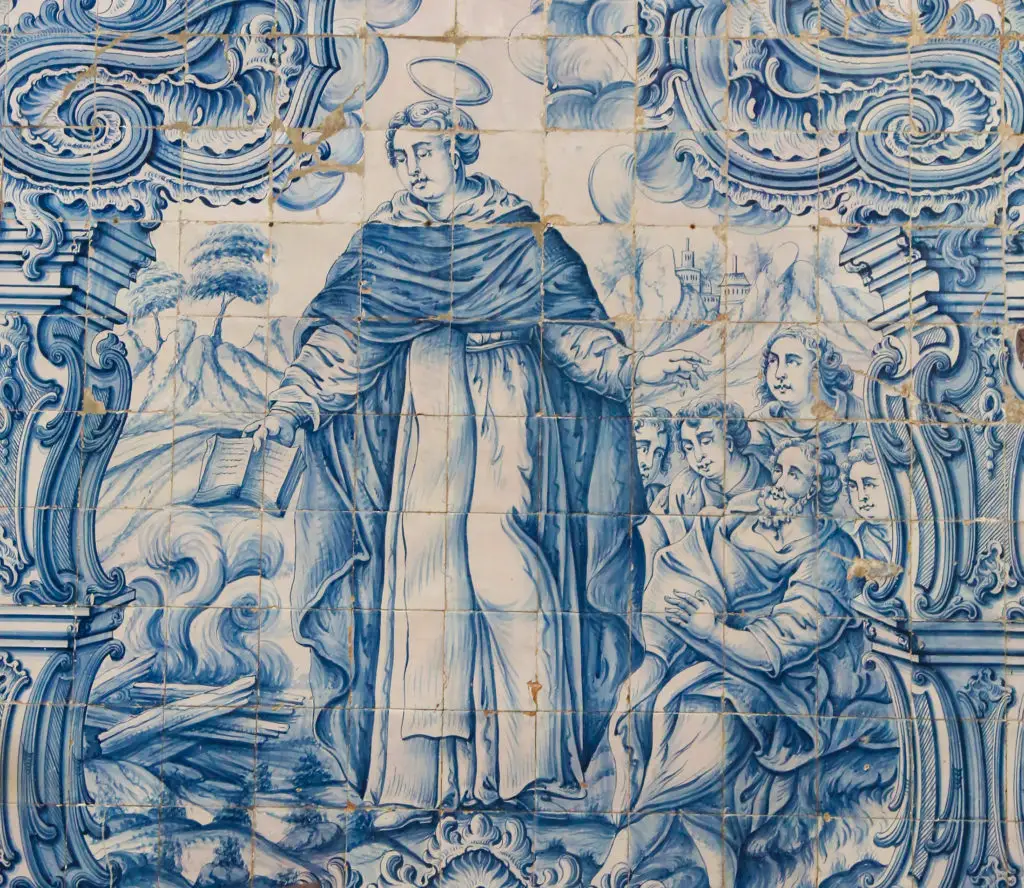
In 1214 he withdrew into a forest near Toulouse, France to pray and do penance for three days and nights, especially to Our Lady.
Our Lady, the Queen of Heaven, heard Dominic’s prayers and appeared with three angels saying:
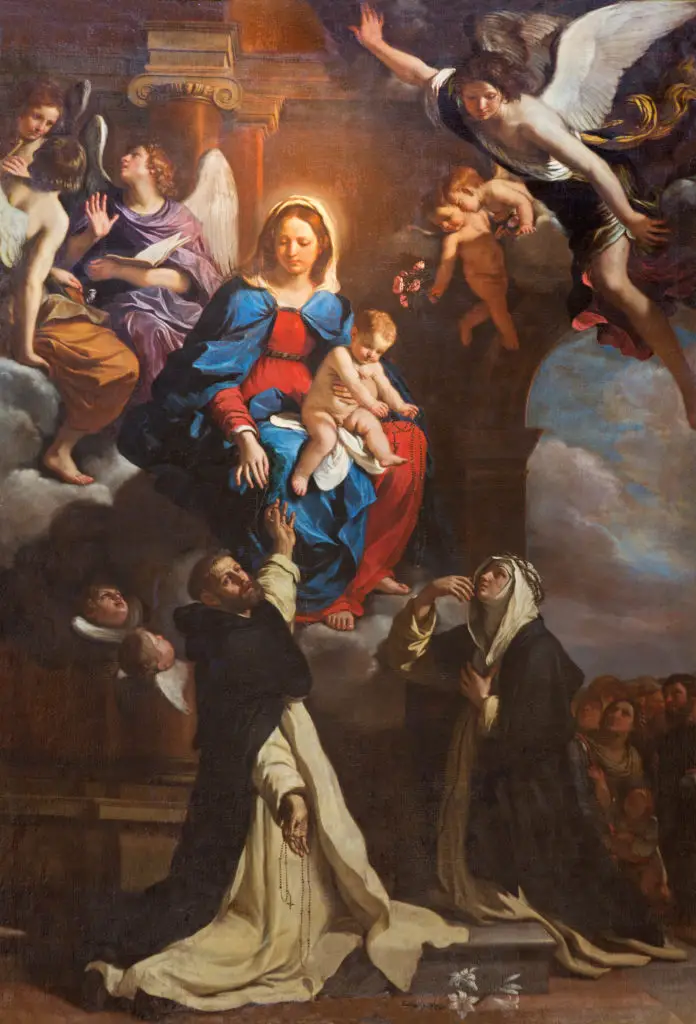
“Dear Dominic, do you know which weapon the Blessed Trinity wants to use to reform the world?”
“Oh, my Lady,” answered St. Dominic, “you know far better than I do because next to your Son Jesus Christ you have always been the chief instrument of our salvation.”
Then did Our Lady instructed him:
“I want you to know that, in this warfare, the battering ram has always been the Angelic Psalter, which is the foundation of the New Testament. Therefore, if you wish to reach these hardened souls and win them over to God, preach my Psalter.”
Our Lady next explained how the Rosarywas to be prayed, thus giving us, through St. Dominic, the Rosary as we know it today.
The 150 Hail Marys were to be divided by Our Fathers into groupings of ten.
As each decade was said, one of the fifteen principal mysteries of the life of Jesus and Mary was to be the subject of meditation.
Our Lady was explicit about this when she later said to Bl. Alan:
“When people say 150 Angelic Salutations this prayer is very helpful to them and is a very pleasing tribute to me. But they will do better still and will please me even more if they say these salutations while meditating on the life, death and passion of Jesus Christ — for this meditation is the soul of this prayer.”
Resultant Victory and Conversions
Beside countless conversions brought about through the power of the Rosary, many battles against the Albigensian heresy were won in the Crusade against them that was led by Simon de Montfort.
These victories often seemed miraculous.
“One day he defeated 10,000 men with a force of 500 men, and on another occasion, he overcame 3,000 men with only 30 men.
Finally, with 800 horsemen and 1,000 infantrymen, he completely put to rout the army of the King of Aragon, which was 100,000 strong, and this with the loss on his side of only one horseman and eight soldiers!” By the time of St. Dominic’s death in 1221, the Albigensian threat was all but ended.
What evidence is there that St Dominic received the Rosary from the Mother of God?
The Evidence by Blessed Alan de la Roche
Blessed Alan de la Roche, a Dominican Priest of Dinan in Brittany, was raised by heaven to fight the trials of the.
On an occasion whilst saying Mass, Jesus spoke to him from the Sacred Host saying:
“You are crucifying Me again now because you have all the learning and understanding that you need to preach My Mother’s Rosary, and you are not doing so.
If you only did this, you could teach many souls the right path and lead them away from sin — but you are not doing it and so you are guilty of all the sins that they commit.”
This terrified Blessed Alan and he began to teach the Rosary without ceasing. By the time of his death in 1475, he had enrolled over 100,000 persons in the Confraternity.
Popes who support the claim that the Rosary was handed to St Dominic
St Pius V (1569), writes:
“That St. Dominic invented and then propagated in the entire holy Roman Church a mode of prayer, called the Rosary or Psalter of the Blessed Virgin Mary, which consists in honoring the Blessed Virgin by the recitation of 150 Ave Marias, in conformity with the number of David’s psalms, adding to each decade of Aves the Lord’s Prayer and the meditation of the mysteries of the life of our Lord Jesus Christ.”
Pope Gregory XIII (1573)instituted the solemnity of the holy Rosary, recalls that St. Dominic in order to deflect God’s wrath and obtain the help of the Blessed Virgin, instituted this practice so pious that it is called the Rosary or Mary’s Psalter.
On March 26, 1726, Pope Benedict XIII made obligatory the lessons of the Roman breviary for the Matins of the Feast of October 7th, teaching that other Sovereign Pontiffs include:
- Leo X,
- Pius V
- Gregory XIII,
- Sixtus V,
- Clement VIII,
- Alexander VII,
- Innocent XI,
- Clement XI,
- Innocent XIII,
- Benedict XIII,
and of still others, all unanimous in attributing to St. Dominic the institution of the Rosary. These 16th, 17th and 18th Century Popes are important because they continue the tradition, as they are not too far removed from the understanding and teaching, that St Dominic instituted the Holy Rosary through the Blessed Mother.
How to Pray the Rosary and corresponding Prayers?
Note that besides the Rosary being a prayer prayed on beads, the word Rosary also means a rose garden or a bed of roses. Therefore, each time we pray the Rosary we offer Our Lady a bed of roses.
- On the crucifix, make the sign of the cross
In the name of the Father, and of the Son and of the Holy Spirit. Amen
- On the crucifix Recite the Apostles’ Creed.
I believe in God, the Father Almighty, Creator of Heaven and earth; and in Jesus Christ, His only Son, Our Lord, Who was conceived by the Holy Spirit, born of the Virgin Mary, suffered under Pontius Pilate, was crucified; died, and was buried. He descended into Hell; the third day He arose again from the dead; He ascended into Heaven, sits at the right hand of God, the Father Almighty; from thence He shall come to judge the living and the dead. I believe in the Holy Spirit, the holy Catholic Church, the communion of saints, the forgiveness of sins, the resurrection of the body, and life everlasting. Amen.
- On the next LARGE bead, pray the Our Father.
Our Father, Who art in heaven, hallowed be Thy name; Thy kingdom come; Thy will be done on earth as it is in heaven. Give us this day our daily bread; and forgive us our trespasses as we forgive those who trespass against us; and lead us not into temptation, but deliver us from evil, Amen.
- On the following three small beads, pray three Hail Marys.
- On the chain, pray the Glory Be.
- On the large bead, meditate on the first mystery that correspondence to that particular day (see section under Mysteries of the Rosary) and pray the Our Father.
- Skip the centrepiece medallion, and on the ten beads after that, pray a Hail Mary on each bead; on the chain, pray a Glory Be … then the Fatima Prayer:
“O my Jesus, forgive us our sins, save us from the fires of hell, and lead all souls to Heaven, especially those in most need of Thy mercy.”
- Repeat Steps 6 & 7 four more times, each time announcing a different mystery for that day.
- At the end of the Rosary, say the Hail Holy Queen (Salve Regina).
Hail Holy Queen, Mother of Mercy,
our life our sweetness and our hope.
To thee do we cry, poor banished children of Eve;
To thee do we send up our sighs, mourning and weeping in this valley of tears.
Turn then, most gracious advocate, thine eyes of mercy toward us and after this our exile show unto us the blessed fruit of thy womb, Jesus.
O clement, O loving, O sweet Virgin Mary!
Pray for us, O holy Mother of God.
That we may be made worthy of the promises of Christ.
O God, whose only-begotten Son, by His life, death, and resurrection, has purchased for us the rewards of eternal salvation; grant we beseech Thee, that meditating upon these mysteries of the most holy Rosary of the Blessed Virgin Mary, we may imitate what they contain and obtain what they promise. Through the same Christ our Lord. Amen.
Saint Michael the Archangel, defend us in battle. Be our protection against the wickedness and snares of the devil. May God rebuke him we humbly pray; and do Thou, O Prince of the Heavenly Host, by the Power of God, cast into hell Satan and all the evil spirits, who prowl through the world seeking the ruin of souls. Amen.
Finish with the Sign of the Cross.
What are the Mysteries of the Rosary?
The Mysteries of the Rosary
| The Joyful Mysteries | (Traditional: Monday & Thursday) | (Post-2002: Monday & Saturday) |
|---|---|---|
| Mystery | Scripture Reference | Fruit of the Mystery |
| Annunciation | St Luke 1:26-38; Psalm 44:11-12) | Humility |
| Visitation | St Luke 1:39-56; Psalm 138:17 | Love of Neighbour, Charity |
| Nativity | St Luke 2:1-20; Psalm 95:11-13 | Love of God, Poverty |
| Presentation in the Temple | St Luke 2:21-39; Psalm 47:10-11 | Obedience |
| Finding in the Temple | St Luke 2:42-52; Psalm 26:4-5 | Zeal for God |
| Sorrowful Mysteries | (Traditional: Tuesday & Friday) | (Post-2002: Tuesday & Friday) |
|---|---|---|
| Mystery | Scripture Reference | Fruit of the Mystery |
| Agony in the Garden | St Matthew 26:36-46; St Luke 22:39-48 | Sorrow for Sin, Contrition |
| Scourging at the Pillar | St Mark 15:15 | Purity |
| Crowning with Thorns | St Matthew 27:27-31 | Courage |
| Carrying of the Cross | St Luke 23:25-31 | Patience |
| Crucifixion | St John 19:17-30 | Perseverance |
| Luminous Mysteries | Post-2002: Thursday | |
|---|---|---|
| Mystery | Scripture Reference | Fruit of the Mystery |
| Baptism in the Jordan | St Matthew 3:17 | Sacrament of Baptism |
| Wedding at Cana | St John 2:1-12 | To Jesus through Mary |
| Proclamation of the Kingdom | St Mark 1:15; 2:3-13; St Luke 7: 47-48 | Repentance, Trust in God, Desire for Holiness |
| The Transfiguration | St Luke 9:35 | Spiritual Courage |
| Institution of the Eucharist | St John 13:1 | Adoration of the Eucharist |
| Glorious Mysteries | (Traditional: Wednesday & Saturday) | (Post-2002: Wednesday & Sunday) |
|---|---|---|
| Mystery | Scripture Reference | Fruit of the Mystery |
| Resurrection | St Mark 16:1-20 | Faith |
| Ascension | Acts 1:1-20 | Hope |
| Descent of the Holy Spirit | Acts 2:1-41 | Love of God |
| Assumption of Mary | Apocalypse 12:1; Psalm 15:9-11 | Grace of a Holy death |
| Coronation of Mary | Apocalypse 12:1; 3 Kings 2:19 | Trust in and Devotion to Mary |
Note on Sunday meditate on the Mystery the correspondence with the Church Season for e.g. Ordinary Time = Glorious Mysteries; Advent & Christmastide = Joyful Mysteries; Lent = Sorrowful Mysteries.
What are the Fifteen Promises of the Rosary?
The Fifteen Promises of the Holy Rosary
Given by Our Lady to Saint Dominic and Blessed Alan de la Roche.
1. Whoever shall faithfully serve me by the recitation of the Rosary, shall receive signal graces.
2. I promise my special protection and the greatest graces to all those who shall recite the Rosary.
3. The Rosary shall be a powerful armor against hell; it will destroy vice, decrease sin, and defeat heresies.
4. It will cause virtue and good works to flourish; it will obtain for souls the abundant mercy of God; it will withdraw the hearts of men from the love of the world and its vanities, and will lift them to the desire of eternal things. Oh, that souls would sanctify themselves by this means.
5. The soul which recommends itself to me by the recitation of the Rosary, shall not perish.
6. Whoever shall recite the Rosary devoutly, applying himself to the consideration of its mysteries shall never be conquered by misfortune. God will not chastise him in His justice, he shall not perish by an unprovided death; if he be just he shall remain in the grace of God, and become worthy of eternal life.
7. Whoever shall have a true devotion for the Rosary shall not die without the sacraments of the Church.
8. Those who are faithful to recite the Rosary shall have during their life and at their death the light of God and the plenitude of His graces; at the moment of death they shall participate in the merits of the saints in paradise.
9. I shall deliver from Purgatory those who have been devoted to the Rosary.
10. The faithful children of the Rosary shall merit a high degree of glory in Heaven.
11. You shall obtain all you ask of me by the recitation of the Rosary.
12. All those who propagate the holy Rosary shall be aided by me in their necessities.
13. I have obtained from my Divine Son that all the advocates of the Rosary shall have for intercessors the entire celestial court during their life and at the hour of death.
14. All who recite the Rosary are my sons, and brothers of my only Son Jesus Christ. 15. Devotion of my Rosary is a great sign of predestination.
Some additional quotes from ‘The Secret of the Rosary’, by Saint Louis Mary De Montfort. This is a fantastic read on the Rosary.
Here are some quotes for your edification:
Our Lady also said to Blessed Alan:
“I want you to know that, although there are numerous indulgences already attached to the recitation of my Rosary, I shall add many more to every fifty Hail Marys (each group of five decades) for those who say them devoutly, on their knees—being, of course, free from mortal sin. And whosoever shall persevere in the devotion of the Holy Rosary, saying these prayers and meditations, shall be rewarded for it; I shall obtain for him full remission of the penalty and of the guilt of all his sins at the end of his life. Do not be unbelieving, as though this is impossible. It is easy for me to do because I am the Mother of the King of heaven, and He calls me full of grace. And, being full of grace, I am able to dispense grace freely to my dear children.” (De Montfort, L. M. (1957). The Secret of the Rosary (M. Barbour, Trans.; p. 102). Montfort Fathers Publications.)
One day Our Lord said to Blessed Alan:
“If only these poor wretched sinners would say my Rosary, they would share in the merits of My passion and I would be their Advocate and would appease My Father’s Justice.” (De Montfort, L. M. (1957). The Secret of the Rosary (M. Barbour, Trans.; p. 95). Montfort Fathers Publications.)
Is there and Indulgence associated with Praying the Rosary?
What is an INDULGENCE?
An indulgence is a lessening of the satisfaction necessary for making up for our sins, even after we are forgiven. This is granted by the Catholic Church.
It is a remission, in whole or in part, of the temporal punishment due to sin—and is thus known as a plenary or a partial indulgence.
Note that: Confession and Communion are required to gain a plenary indulgence. But it is not necessary to go to Communion every time we wish to gain an indulgence. Weekly Communion will suffice.
The following are some of the indulgences granted to all the faithful:
PLENARY
1. For devout recitation of the Rosary (five decades) before the Blessed Sacrament, exposed or in the tabernacle.
2. At the end of a Novena in honor of Our Lady of the Rosary.
PARTIAL
1. Five years, each time the Rosary is said.
2. Ten years, once a day, for saying the Rosary with others.
3. Five years, each day of a Novena in honor of Our Lady of the Rosary.
4. On beads to which are attached the Crozier, Dominican, and Brigittine indulgences: Crozier—27,500 days; Dominican—5,500 days; Brigittine—5,500 days, each time the Rosary is said. (De Montfort, L. M. (1957). The Secret of the Rosary (M. Barbour, Trans.; pp. 187–188). Montfort Fathers Publications).
IN OCTOBER
1. A toties quoties indulgence on the feast of the Holy Rosary, October 7 (in Dominican churches, the first Sunday in October). This means that, for a devout visit to the Rosary chapel or image of the Blessed Virgin, from noon of the vigil to midnight of the feast, a plenary indulgence may be gained for each visit. Six Our Fathers, six Hail Marys, and six Glory be to the Fathers for the intention of the Pope are the only prayers that need be said.
2. For the recitation of the Rosary on the feast and during the octave, i.e., a total of eight days, a plenary indulgence may be gained on the feast and once during the octave.
3. One plenary indulgence for the recitation of the Rosary for ten days after the octave of the feast.
4. Seven years for each attendance at the regular October devotions, or for private recitation of the Rosary.
5. It will be readily seen that we can gain many indulgences through our recitation of the Rosary—thus lessening the satisfaction that we must make in Purgatory. We should also offer up some of the indulgences for the souls now in Purgatory, asking God to relieve their sufferings. (De Montfort, L. M. (1957). The Secret of the Rosary (M. Barbour, Trans.; pp. 187–188). Montfort Fathers Publications).
Finally,
The Mother of God reminded the world of the necessity of praying the Rosary every day.
The apparition at Fatima, 1917, Our Lady reminded the three children and the whole world,
“Recite the rosary every day to obtain the peace for the world and the end of the war.”
The Lady of Rosary reminded the children at every apparition.
St Dominic was given the promise from Our Lady that:
“One day, through the Rosary and the Scapular, I will save the world.”
Our Lady of the Rosary, Pray for us!
St Domonic, Pray for us!
